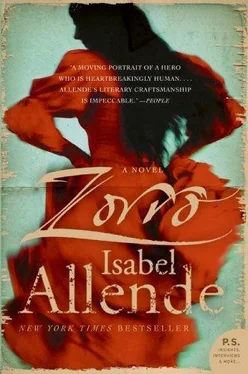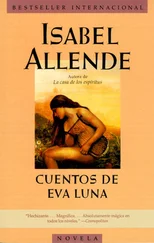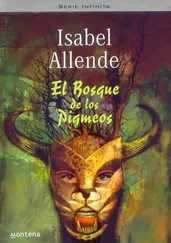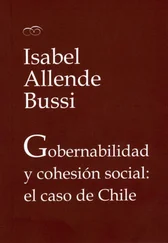Isabel Allende - Zorro
Здесь есть возможность читать онлайн «Isabel Allende - Zorro» весь текст электронной книги совершенно бесплатно (целиком полную версию без сокращений). В некоторых случаях можно слушать аудио, скачать через торрент в формате fb2 и присутствует краткое содержание. Год выпуска: 2005, ISBN: 2005, Издательство: Harper Perennial, Жанр: Исторические приключения, на английском языке. Описание произведения, (предисловие) а так же отзывы посетителей доступны на портале библиотеки ЛибКат.
- Название:Zorro
- Автор:
- Издательство:Harper Perennial
- Жанр:
- Год:2005
- ISBN:9780060779009
- Рейтинг книги:3 / 5. Голосов: 1
-
Избранное:Добавить в избранное
- Отзывы:
-
Ваша оценка:
- 60
- 1
- 2
- 3
- 4
- 5
Zorro: краткое содержание, описание и аннотация
Предлагаем к чтению аннотацию, описание, краткое содержание или предисловие (зависит от того, что написал сам автор книги «Zorro»). Если вы не нашли необходимую информацию о книге — напишите в комментариях, мы постараемся отыскать её.
Zorro — читать онлайн бесплатно полную книгу (весь текст) целиком
Ниже представлен текст книги, разбитый по страницам. Система сохранения места последней прочитанной страницы, позволяет с удобством читать онлайн бесплатно книгу «Zorro», без необходимости каждый раз заново искать на чём Вы остановились. Поставьте закладку, и сможете в любой момент перейти на страницу, на которой закончили чтение.
Интервал:
Закладка:
“Then you do not need that mask. Your name, son,” the priest replied. “Zorro. I know this seems strange, but stranger still is what I am going to tell you, Padre. Please come inside.” The missionary led the mysterious horseman to the chapel, thinking that there he would find divine protection and could convince him that there was little of value in the mission. The man was frightening; he had a sword, a pistol, and a whip. He was outfitted for war, but there was something vaguely familiar about him. Where had he heard that voice? Zorro began by assuring him that he was not a ruffian, and then confirmed the priest’s suspicions about Moncada and Alcazar’s having harvested the pearls. Legally their share was only ten percent; the rest of the treasure belonged to Spain. They were working the Indians like slaves, sure that no one except Padre Mendoza would intercede for them. “I have no one to go to, son. The new governor is a weak man, and he is afraid of Moncada,” the missionary stated. “Then you must go to the authorities in Mexico and Spain, Padre.”
“With what proof? No one will believe me; I have a reputation for being an old fanatic, obsessed with the Indians’ well-being.”
“Here is proof,” said Zorro, placing a heavy bag in his hands. The missionary looked inside and cried out with surprise when he saw so many pearls. “God in heaven, son! How did you get this!”
“How is unimportant.” Zorro suggested that Padre Mendoza take the bag to the bishop in Mexico City and report what had happened, the only way to prevent the neophytes from being enslaved. If Spain decided to exploit the oyster banks, they could pay Yaqui Indians, as they had before. Then he asked the missionary to tell Diego de la Vega that his father was free and safe. The priest commented that the young man had been a disappointment; he lacked grit, and did not seem like a son of Alejandro and Regina. Again he asked the visitor to show his face. Otherwise he could not trust his word; all this could be a trap. The masked man told him that his identity had to remain a secret, but he promised the priest that he would not be alone in his work to defend the poor. From now on Zorro would stand for justice. Padre Mendoza laughed nervously; possibly the fellow was an escaped madman. “One last thing, Padre. This chamois pouch contains one hundred and three pearls finer than all the others; they are worth a fortune. They are yours. You do not need to mention them to anyone; I assure you that the one person who knows of their existence would not dare ask about them.”
“I suppose they are stolen.”
“Yes, they are, but in all fairness they belong to the ones who ripped them from the sea with their last breaths. You will know how to use them wisely.”
“If they were unfairly taken, I do not want to see them, my son.”
“You do not have to see them, Padre, but take good care of them,” Zorro replied with a wink of complicity. The missionary hid the pouch among the folds of his habit and walked with the visitor to the courtyard where the lustrous black horse was waiting, surrounded by the children of the mission. The masked man mounted his steed. To thrill the children, he whistled, and his mount whirled and reared; then he pulled out his sword and flashed it, making it glint in the lantern light, and sang a verse that he himself had composed during the idle months in New Orleans: something about a valiant horseman who rides out on moonlit nights to defend justice, punish evildoers, and slash a Z with his sword. The song beguiled the children but increased Padre Mendoza fear that the man was out of his mind. Isabel and Nuria, who had spent most of the day in their room sewing, came out onto the courtyard just in time to glimpse the gallant figure making pirouettes on his black mount before riding off. They asked who the dashing horseman was, and Padre Mendoza replied that if he wasn’t a devil, he must be an angel sent by God to reinforce his faith. That same night Diego de la Vega returned to the mission covered with dust and full of the story of how he had nearly perished at the hands of bandits and so had cut his trip short. He had seen a couple of suspicious characters in the distance and to avoid them had left the Camino Real and galloped into the woods, but he got lost. He spent the night curled up beneath the trees, safe from the brigands but at the mercy of bears and wolves. At dawn he realized where he was and decided to return to San Gabriel; it would have been imprudent to go on alone. He had ridden all day without a bite to eat; he was completely fatigued, and he had a headache. He would leave for Monterey in a day or two, but this time he would go armed and with an escort. Padre Mendoza informed him that his visit to the governor was no longer necessary because an unknown hero had rescued Don Alejandro de la Vega from prison. All that was left for Diego was to recover the family fortune. He kept to himself his doubts about whether this sickly dandy was capable of doing it. “Who rescued my father?” Diego asked. “He called himself Zorro, and he wore a mask,” the missionary said. “Mask? Was he an outlaw, then?” was Diego’s question. “I saw him, too, Diego, and for an outlaw he was not at all bad. I cannot tell you how handsome and elegant he was! Furthermore, he was riding a horse that must have cost an eye from his head,” Isabel intervened enthusiastically. “You always have had more imagination than is good for you,” he replied. Nuria interrupted to announce dinner. That night Diego ate voraciously, despite the heralded migraine, and when he finished he congratulated the chaperone, who had greatly improved the mission fare, as he had known she would. Isabel questioned him mercilessly: she wanted to know why his horses were not worn out, what the purported highwaymen he saw on the road looked like, how long it took him to go from one point to another, and the reason why he had not stayed in another mission only a day’s ride away. Padre Mendoza was so immersed in his own musings that he did not notice the vagueness of Diego’s answers. He ate with his right hand and with his left kept feeling the chamois pouch, thinking how its contents could restore the mission to his former condition. Had he sinned by accepting those pearls stained with suffering and greed? No. Not sinned, certainly, but they might bring bad luck… He smiled at how superstitious he had become over the years. A day or two later, after Padre Mendoza had sent a letter about the pearls to Mexico City and was packing for the trip with Diego, Rafael Moncada and Carlos Alcazar came riding up at the head of a number of soldiers, among them the chubby Sergeant Garcia. Carlos had a disfiguring scar on his cheek, and he was nervous because he had not been able to convince his partner how the pearls had disappeared. The truth was little help in this case, as it only highlighted his sorry role in defending the prison and the treasure. He had chosen to tell Moncada that fifty Indians had burned down El Diablo while a gang of outlaws under the leadership of a black-clad, masked man who identified himself as Zorro ransacked the prison. After a bloody struggle, in which he was wounded, the attackers had overcome the soldiers and ridden away with the pearls. The prisoners had escaped in the confusion. Alcazar knew that Moncada would not be happy until he knew the whole truth and found the pearls. The escaped fugitives were of the least importance; there were plenty of Indians to take their places. The curious shape of the cut on Alcazar’s face a perfect Z had reminded Moncada of a masked man whose description corresponded to Zorro’s, and who had traced a similar letter at the residence of Le Chevalier’s residence and in a barracks in Barcelona. On both occasions the pretext had been to set some prisoners free, as had been the case in El Diablo. Worse, however, on the second occasion he had had the audacity to use his, Moncada’s, name and that of his aunt Eulalia. He had sworn to repay that insult, but he had not as yet laid a glove on him. He was, however, quickly reaching the only possible conclusion: Diego de la Vega was in Barcelona when someone had left a Z on a wall, and as soon as he landed in California someone had made the same mark on Alcazar’s cheek. It was not mere coincidence. This Zorro could be no one but Diego. It was difficult to believe, but it was reason enough to make de la Vega pay for the trouble he had caused. Moncada had ridden at top speed to the mission, fearing that his prey might have escaped, but here was Diego, sitting beneath a grape arbor, drinking lemonade and reading poetry. Moncada ordered Sergeant Garcia to arrest him, and the poor tubby sergeant, who had never lost his unconditional boyhood admiration for Diego, unwillingly started to do his bidding. He was stopped by Padre Mendoza, who declared that the masked man was not even remotely like Diego de la Vega. Isabel backed him up; not even an idiot could confuse those two men, she said. She knew Diego like a brother, she had lived at his side for five years; he was a good young man, inoffensive, sentimental, often ill. There was no touch of bandit, much less hero, in him. “Well, thank you,” Diego cut her off, offended, but he noticed that his friend’s wandering eye was whirling like a top. “Zorro helped the Indians because they are innocent,” said the missionary. “You know that as well as I, Senor Moncada. He did not steal the pearls; he took them as proof of what is going on in El Diablo.”
Читать дальшеИнтервал:
Закладка:
Похожие книги на «Zorro»
Представляем Вашему вниманию похожие книги на «Zorro» списком для выбора. Мы отобрали схожую по названию и смыслу литературу в надежде предоставить читателям больше вариантов отыскать новые, интересные, ещё непрочитанные произведения.
Обсуждение, отзывы о книге «Zorro» и просто собственные мнения читателей. Оставьте ваши комментарии, напишите, что Вы думаете о произведении, его смысле или главных героях. Укажите что конкретно понравилось, а что нет, и почему Вы так считаете.











